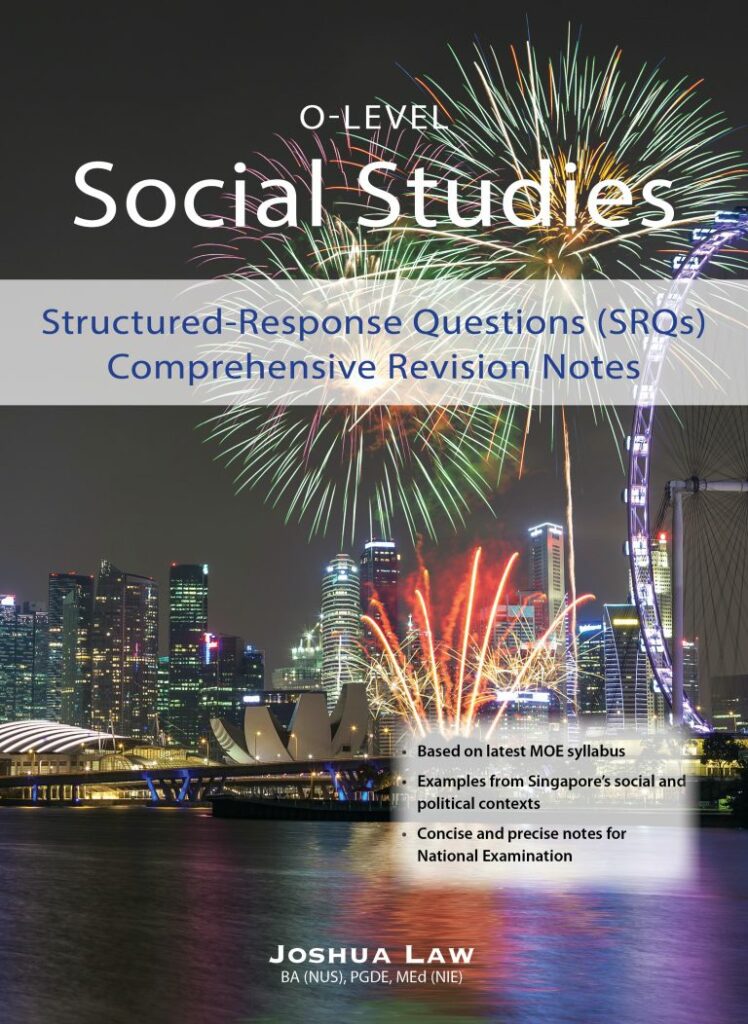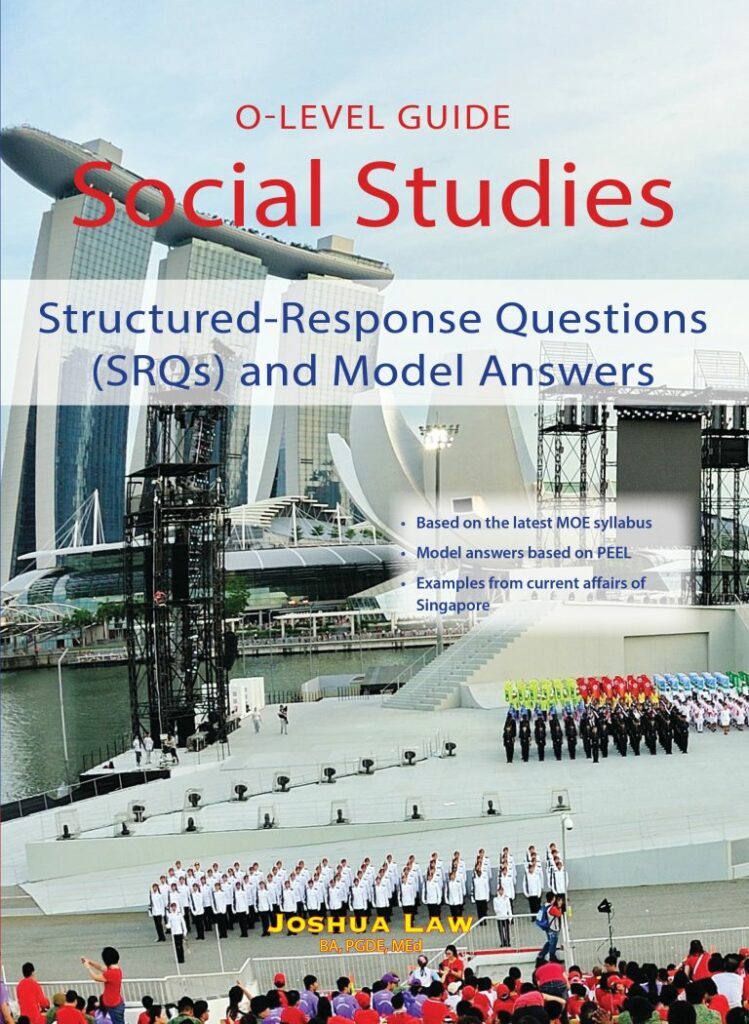Joshua graduated from the National University of Singapore (NUS) with a degree in Arts and Social Science. Thereafter, he pursued his childhood dream of becoming a Humanities teacher at the National Institute of Education (NIE). Joshua believes that studying the Humanities is more about gaining ‘Heart-knowledge’ rather than ‘Head-knowledge’. According to Joshua, the beauty of teaching the Humanities is to not only impart ‘Knowledge’ and ‘Skills’, but also to promote positive values that encourage our students to be informed global citizens.
Joshua is the author of the O-Level Social Studies: Structured-Response Questions (SRQs) Comprehensive Revision Notes and O-Level Guide: Social Studies Structured-Response Questions (SRQs) and Model Answers guide books. These books help students answer the SRQ-section questions in Social Studies with confidence.
Today, Joshua shares with us more about the P.E.E.L. method of answering questions, and additional tips on how students can effectively tackle SRQ questions for their exams.
About your books

- How should students use these books to effectively master Social Studies?
Students need to master three different themes in the current upper secondary Social Studies syllabus. They are:
1. Governance and Citizenship
2. Diversity
3. Globalisation
The Structured Response Questions (SRQs) listed in this book are categorised into these 3 themes. As part of their revision, students should attempt questions selected from all the 3 themes in order to be familiar with the type of questions that will be tested in the national examinations.
After writing their own answers for the selected questions from the book, they can use the model answers as a reference to see if they have linked their answers back to the questions adequately. By practising a variety of questions, students will be more confident to master the SRQ section in their Social Studies exams.
2. Can you explain what are Structured Response Questions (SRQs)?
Structured Response Questions (SRQs) are tested in Section B at the national examinations. SRQs consist of two questions. The first question is allocated 7 marks while the second question is allocated 8 marks.
Students are given three extracts about a given theme. The extracts can be in the form of a paragraph, diagram or photograph. Based on the extracts, students need to answer questions in response to the extracts given.
Many a times, these extracts serve as hints to prompt students about what to write in their SRQ answers. The types of questions can be wide ranging in nature. For example, students may be asked about the causes and consequences of a societal issue or even for suggestions to solve a societal problem.
3. What are some of the challenges that students face in answering SRQs?
One main challenge that students face is the lack of content knowledge about the 3 themes. They struggle to remember and explain the key content and concepts required.
Another problem is that students do not know how to link their answers back to the questions. They may write a lot of details and still be awarded very low marks as they have failed to address the key requirement in the questions.
Many students are unable to structure their answers in an organised and detailed manner in order to score higher marks.
4. Can you share more about the P.E.E.L format (Point, Elaboration, Explanation and Link) and why this format should be used?
The P.E.E.L format is commonly used in schools to teach students how to organise their thoughts and answers in a coherent and well-supported paragraph.
In every P.E.E.L paragraph, the POINT is in the first sentence where students begin by stating or identifying a main factor, cause, consequence or even suggestion.
ELABORATION is where students unpack the key definitions and ideas required in the question.
EXPLANATION is where students explain their answer using a concrete example.
LINK is the most important part for the students to conclude their answers to address the issue highlighted in the question. For students to write a strong P.E.E.L paragraph, they will have to think about prompting questions (Who? What? Where? When? Why? How?) to construct their answers.
5. What else can students do in order to master the skills and techniques to answer SRQs?
Students should plan their answers well instead of rushing into it. They must read the questions carefully to understand what is actually required.
Another important technique is time management. Students should not spend too much time on one question and neglect the other. They should spend equal an amount of time for each SRQ question (about 15 min for each question).
Also, students should focus on providing a quality answer by elaborating on a strong factor or example in each paragraph rather than giving too many factors or examples.
6. Can you share what examiners look for as a high-level response answer to SRQs?
Examiners look for students’ understanding of the key content and concepts for each question. Students must show that they can apply logical thinking and address the issue in the questions, rather than regurgitating what they have memorised from the textbook.
Examiners also want students to give concrete examples to illustrate what they are trying to explain in their answers.
7. How can parents help their children to excel in the Humanities?
Parents can help their children to excel in the Humanities by encouraging them to be more aware about what is going on in Singapore and around the world.
For example, by discussing with them about challenges such as the COVID-19 crisis and how the government is handling them, students will be able to apply what they learn about governance in their daily lives.
8. Lastly, is there any other advice that you would give to students who are studying the Humanities?
Students should learn to enjoy the Humanities and relate it to their own lives. For example, they should learn to appreciate Singapore as the beautiful and resilient country that they are living in now.
By being curious and interested in the economic and environmental challenges that Singapore and the world are facing amidst the pandemic, students will be able to appreciate the Humanities better.
About Yourself/Work/Expertise
- What inspired you to become a Humanities teacher?
I hope to make a difference in Singapore and in the world, one student as a time. I am grateful for what Singapore has done for me, and becoming a Humanities teacher is a meaningful way to pay it forward through working with young lives.
2. Having taught at various schools, what are some common responses and attitudes that students have towards the Humanities subjects?
Humanities subjects are often neglected as parents and students are generally more concerned about Mathematics and Sciences. Students have the false belief that they are unable to excel in the Humanities subjects for various reasons.
3. How would you encourage students to be interested in the Humanities?
I would encourage students to pursue learning beyond their textbooks and the classrooms. By visiting different places in Singapore, they will actually see how different Humanities subjects can come alive.
For example, I bring my students to the different islands of Singapore to learn more about the social, economic and environmental development of Singapore in the last 5 decades.
During our boat trip to Lazarus and St John’s Islands, I shared more about the globalised world by making references to the PSA and the container ships that passed our yacht.
This November and December holidays, we will be visiting various charitable organisations for students to learn about the various needs of the less fortunate amidst the pandemic.
4. Can you share more about “Heart-knowledge”?
“Heart-knowledge” is about values. Social Studies as an examination subject at upper secondary level was introduced by the MOE in response to the lack of knowledge and understanding about Singapore’s social and economic development and the threats it faces. As such, values inculcation is essential in the teaching and learning of Social Studies.
For the theme of Citizenship and Governance, I strive to inculcate the values of loyalty and love for Singapore. For the theme of Diversity, I aim to inculcate respect and appreciation for the different races and religions around us.
5. How can “Heart-knowledge” work effectively in tandem with “Head-knowledge” to the students’ best advantage?
Educating students in the Humanities is not just about the learning of facts. When the students’ hearts are engaged emotionally with the subjects, they will naturally develop greater understanding and a deep passion to continue learning beyond the syllabus.
The things that they learn in class will still be in their hearts and minds, even after the national examinations. The hope is that, after graduation, students will still passionately care for the environment and love Singapore. They will also be mindful to respect one another’s differences and contribute to the society and world at large.

